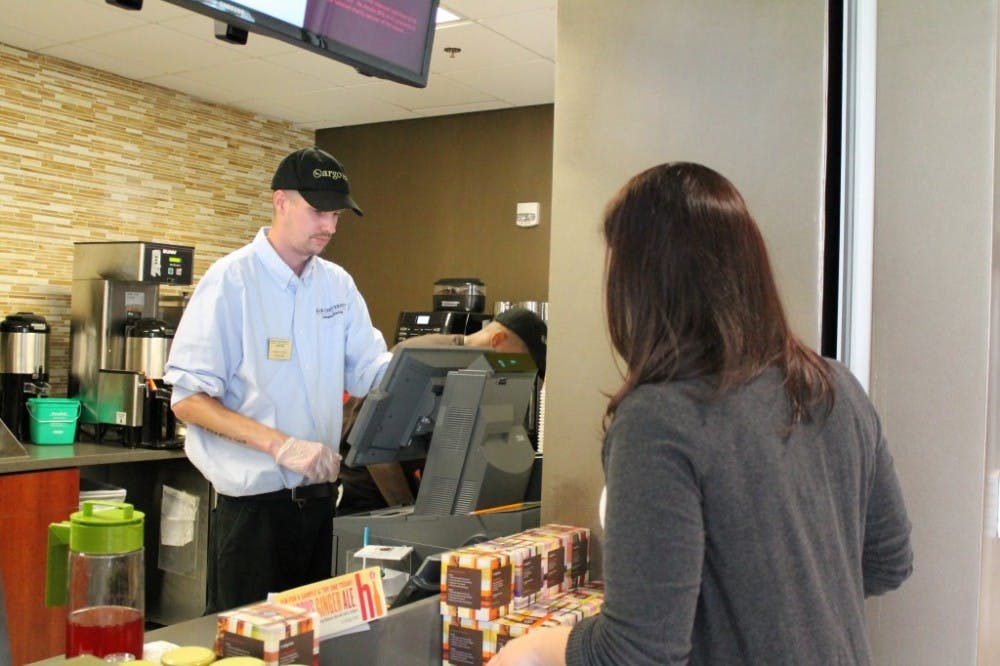Dan Tart sat on a cushy, green couch in the lounge of Argo Tea, reflecting on an opening week in which demand exceeded supply on more than one occasion. Mid-sentence, a group of students in search of a snack interrupted the manager of Argo Tea and Winter Garden Cafe. Peering through the closed steel shutters to catch a glimpse of the menu, the half-dozen students complained loudly about the closure before leaving, still hungry.
It was 3 p.m. on a Friday afternoon.
“The demand is there,” said Tart, as the students left, dissapointed.
The U.S. tea market has seen a recent surge in profits, with the sale of tea products expected to reach $25 billion this year, according to Packaged Facts, a consumer goods research firm. Argo now looks to tap into the drink’s potential at Elon University.
Tart knew a tea shop with an international flavor would work at Elon, considering the university’s push for global engagement and the number of students who study abroad. In keeping with Argo’s food standards, Tart oversees imported breads from France, as well as an exhaustive tea list from different countries.
At first, it might not seem that the concept of tea works for everyone, Tart said. Yet those who are not big tea drinkers can find their signature drink, snack or meal at Argo Tea. Tart himself never liked tea before Elon sent him to Chicago for training.
“There is so much variety that anyone can find something for themselves,” he said. “And it’s really good for you.”
The tea and coffee shop, which officially opened on campus in the Global Commons on Sept. 8, opened its doors in Chicago in 2003. Since then, the company has expanded to Massachusetts, Washington D.C., Virginia, Michigan, North Carolina, New York and several countries in the Middle East.
According to Tae Kim, director of business development at Argo, the franchise will continue to explore new locations, with a focus on innovative technologies that are said to better market tea to younger people, especially college students.
“Tea is the fastest growing beverage in the United States,” she said. “So how do you make it attractive and taste good?”
“TEA-osks,” as Argo calls its own version of the street-side kiosk carts, are common in universities, hospitals and airports because of their convenience and tea’s percieved health benefits as an alternative to coffee, Kim said.
She explained that Argo Tea has an advantage on college campuses because students as a whole tend to be more open-minded and willing to try new things.
Tart has seen exactly that during Argo’s first week at Elon. When he reviewed the days’ purchases, he noticed that every day was different. With a truck delivering food once every two weeks, it was hard for Tart to determine what to order.
As Elon continues to diversify its student population, it has started to acknowledge its students’ diverse dietary needs. Argo offers gluten-free, vegan and vegetarian salads, paninis and baked goods. The small TEA-osk in Global Commons makes it easier for students to find heathier food and is said to be safer for students tseeking to avoid common allergens.
“It addresses where campuses are going with their food options,” Kim said.
Sophomore Nicky Kratzer and her friends ate at Argo for the first time on Friday afternoon. They were all pleasantly surprised by how good the food was.
“It tasted like real food,” Kratzer said. “It didn’t taste like dining hall food.”
She and sophomore Abbey Maloney praised the staff for being accomodating and easygoing. Maloney was especially impressed by Argo’s willingness to substitute swipe options.
Aramark affiliates have been criticized in the past for a failure to make substitutions, something Pulkit Vigg, Aramark’s recently hired resident district manager, has said he’s trying to fix.
Accommodating the customer is part of the business, according to Tart. If students are happy, they’ll keep coming back, and they’ll bring their friends. He said sales proved that; on its second day, Argo had more than 100 sales more than on opening day.
And he’s not done yet. Soon, he hopes to display student artwork on the walls of the lounge and to have student musicians perform four nights a week from 6-8 p.m.


